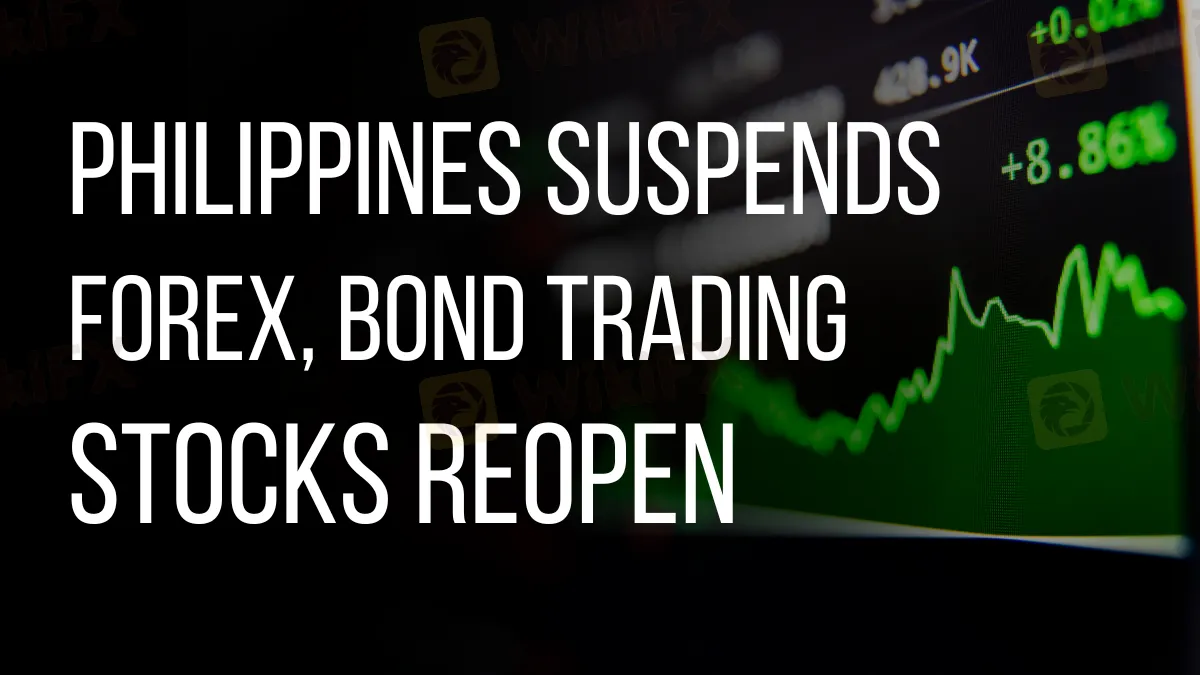简体中文
繁體中文
English
Pусский
日本語
ภาษาไทย
Tiếng Việt
Bahasa Indonesia
Español
हिन्दी
Filippiiniläinen
Français
Deutsch
Português
Türkçe
한국어
العربية
Philippines Suspends FX, Bond Trading; Stocks Reopen
Abstract:The Philippines halts FX and bond trading but reopens the stock market after Typhoon Gaemi's impact. Safety and mobility concerns influenced the decision.

The Philippines paused currency and fixed-income trading on Thursday due to Typhoon Gaemi, which just blew across the nation. However, the stock market has reopened for business, offering some normality among the interruptions.
The Bangko Sentral ng Pilipinas (BSP) issued the suspension, citing its most recent evaluation of the safety and mobility conditions. In a Facebook post, the central bank stressed the importance of protecting the well-being of market participants and the general public. The Philippine Dealing and Exchange Corporation endorsed this move by suspending fixed-income trading.
Despite the suspension of these markets, the Philippine Stock Exchange said in a post on X that equities market activity will resume on Thursday. This measure aims to stabilize financial operations and allow investors to manage their portfolios.
The decision comes after Manila halted government and educational operations on Thursday. Heavy monsoon rains created a landslide that displaced at least half a million people, illustrating Typhoon Gaemi's devastating effect. After wreaking havoc in the Philippines and Taiwan, the typhoon is now heading toward China.
The storm has wreaked havoc, causing extensive power outages in hundreds of thousands of homes, flooding streets, and at least five deaths. Authorities prioritize safety and recovery activities as the country tries to restore order in devastated regions.
You may access the daily news of the financial market here.

Disclaimer:
The views in this article only represent the author's personal views, and do not constitute investment advice on this platform. This platform does not guarantee the accuracy, completeness and timeliness of the information in the article, and will not be liable for any loss caused by the use of or reliance on the information in the article.
Read more

He Lost RM275,000 to a Fraudulent "Moomoo" Scam
A 57-year-old engineer lost RM275000 in an online investment scam that misused the name of a well-known trading platform, Moomoo. The scam was promoted through a Facebook advertisement in April and led the victim to believe he was engaging in a credible investment opportunity.

Can Your Financial Literacy Protect You from Scam Brokers?
You can protect yourself from any kind of investment scam trough your financial Literary . Financial literacy is your strongest defense against investment scams. While the digital age brings countless benefits, it also opens the door to new risks. One growing concern is the steady rise in scam brokers within the forex market.

Scam Alert: 5 Key Reasons to Avoid BazaarFX at All Costs
Before You Act, It's Always a Good Idea to Review Any Broker Thoroughly Know about it first—and only then invest your hard-earned money with the broker. Below are five crucial reasons why you should not choose BazaarFX. Otherwise, you may end up becoming a victim.

EXPOSED: 10 Scam FX Brokers : You Must Avoid in 2025!
Beware, Investors and traders! If you’re planning to invest your money in the forex market, make sure you don’t end up investing with these scam brokers. This is the warning list issued by International Organization of Securities Commissions (IOSCO)
WikiFX Broker
Latest News
Stablecoins go mainstream: Why banks and credit card firms are issuing their own crypto tokens
The Dollar Keeps Falling: How Should We View Exchange Rate Volatility?
Asia-Pacific markets mostly rise as investors parse a slew of data releases
Asia-Pacific markets rise as investors parse a slew of data releases
WikiFX Gala Night Malaysia Concludes Successfully
IG Group Unlocks Over £425 Million amid a Capital Reduction
Gold Prices Fall by INR 39,300 in the Last Week? What's Next Week's Outlook?
European stocks open slightly higher as UK-U.S. trade deal cuts autos, aviation tariffs
Treasury yields tick lower as Trump's spending bill in focus
European stocks mixed as UK-U.S. trade deal cuts autos, aviation tariffs
Currency Calculator


